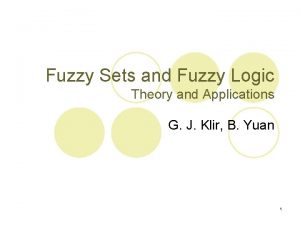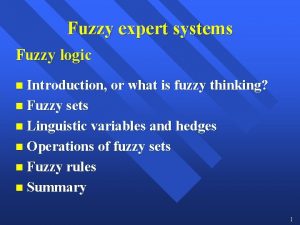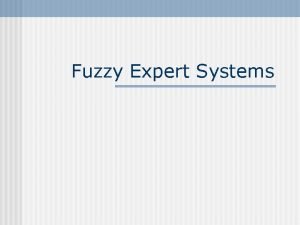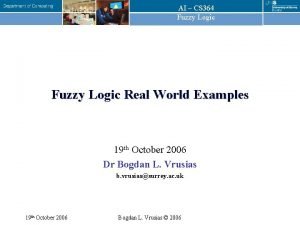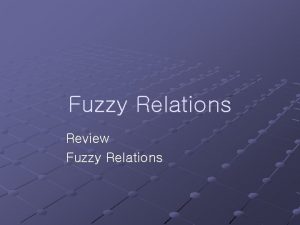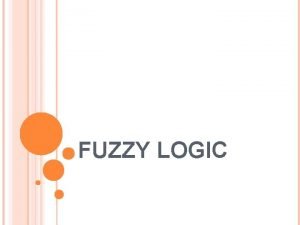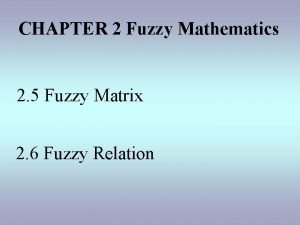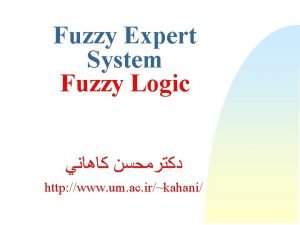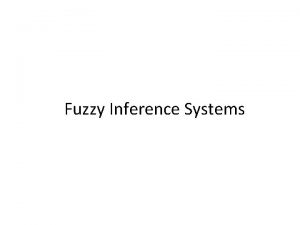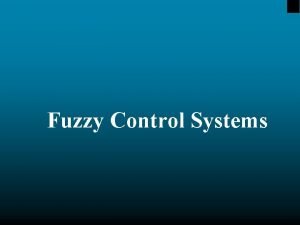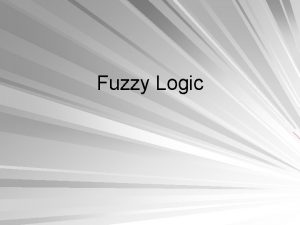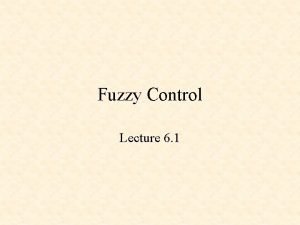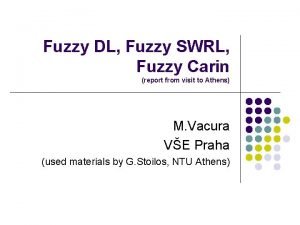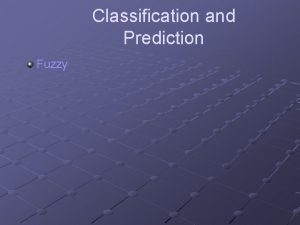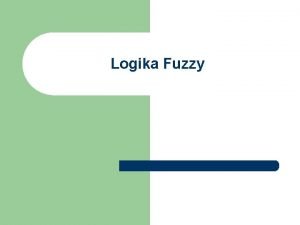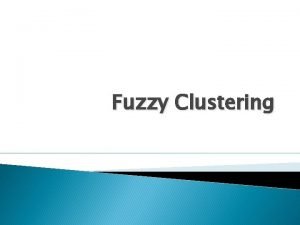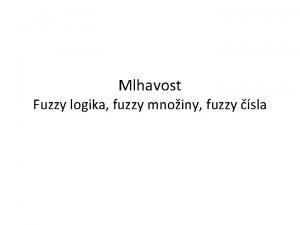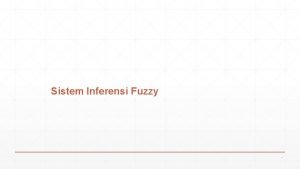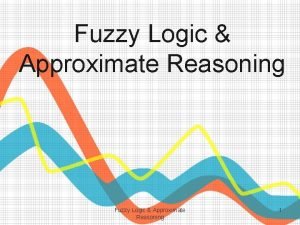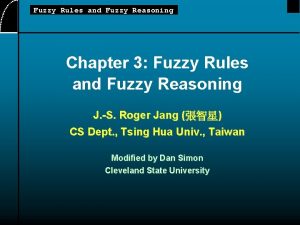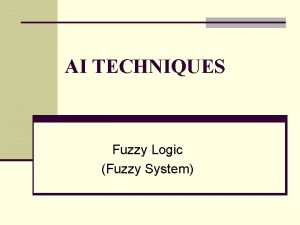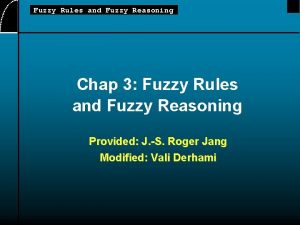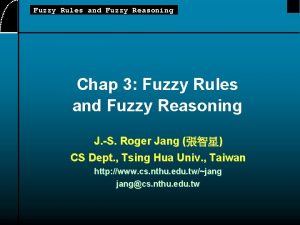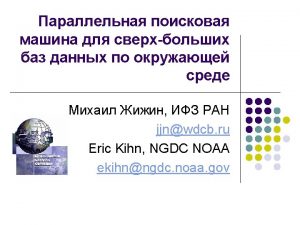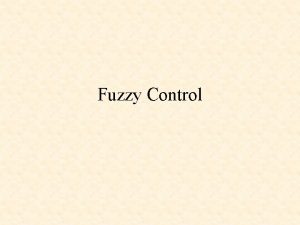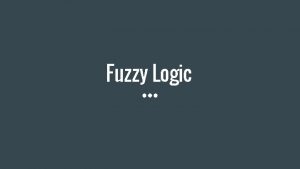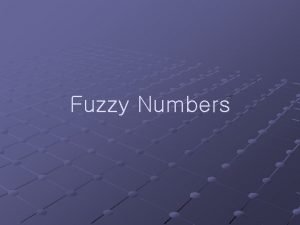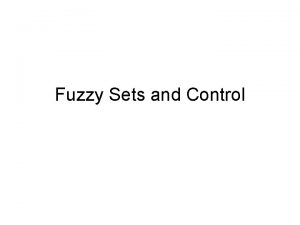WELCOME TO THE WORLD OF FUZZY SYSTEMS DEFINITION


























- Slides: 26

WELCOME TO THE WORLD OF FUZZY SYSTEMS

DEFINITION • Fuzzy logic is a superset of conventional (Boolean) logic that has been extended to handle the concept of partial truth -- truth values between "completely true" and "completely false".

History 1965 The Foundation of the “Fuzzy Set Theory” 1970 First Application of Fuzzy Logic in Control Engineering (Europe) 2000 Fuzzy Logic Becomes a Standard Technology Application of Fuzzy Logic in Business and Finance.

DETERMINISTIC BEHAVIOUR OF FUZZY § Fuzzy system is totally deterministic. fuzzy logic is a logic OF fuzziness, not a logic which is ITSELF fuzzy …!

IMPORTANCE OF FUZZY § It overcomes the limitations of conventional mathematical tools. § Ease of describing human knowledge involving vague concepts. § Cost Effective solution to real world problems

IMPORTANCE TO ENGINEERS • Engineers consists largely of recommending decisions based on insufficient information and even ignorance on the basis of subjective acceptance criteria. So fuzzy provides them ways for treating those uncertainties

CONCEPTUAL STUDY • CLASSICAL CONCEPT This concept is constraintful and has a limited applications in real world as it uses the basis of idealism. • FUZZY CONCEPT This is a more general typed concept and can deal nonlinear and ill-understood problems.

CLASSICAL CONCEPT • Boolean logic. • No partial memberships. • Sharp boundries of membership functions. • No uncertainties allowed.

FUZZY CONCEPT • Fuzzy logic. • Partial membership is allowed. • Membership function varies in the range [0, 1]. • Smooth boundries.

POSSIBILITY VS PROBABILITY Possibility is a measure of degree of ease for a variable to take a value, while probability measures likelihood for a variable to take a value. EXAMPLE: If we are talking about height of say a person : PROBABILITY VIEW The height is between 5 and 6 feet. POSSIBILITY VIEW The person is somewhat tall.

PROBABILITY • POSSIBILITY

• HOW TO SOLVE A PROBLEM USING FUZZY LOGIC ? We need to follow a 4 step process to solve a problem using fuzzy logic. Before that let us discuss important terms associated.

TERMS REGARDING FUZZY CONCEPT • Membership functions • Linguistic variables • Fuzzy rules

MEMBERSHIP FUNCTIONS These are the functions that maps objects in a domain of concern to their membership value in the set.

A membership function usually takes shape as shown below : TRIANGULAR TRAPEZOIDAL

LINGUISTIC VARIABLES A Linguistic variable is like a composition of symbolic variable and a numeric variable. EXAMPLE: Temprature is High. In the above sentence TEMPRATURE is linguistic variable.

FUZZY RULES These are the rules which are the core of the logic and so are made by the experts of the respective areas. These have the form: • IF<antecedent> THEN<consequent> EXAMPLE: IF the annual income is high THEN the person is rich

STEPS OF FUZZY LOGIC • • Fuzzification Inferences Composition Defuzzification

FUZZIFICATION • Under FUZZIFICATION, the membership functions defined on the input variables are applied to their actual values, to determine the degree of truth for each rule premise.

INFERENCES • Under INFERENCE, the truth value for the premise of each rule is computed, and applied to the conclusion part of each rule.

COMPOSITION • Under COMPOSITION, all of the fuzzy subsets assigned to each output variable are combined together to form a single fuzzy subset for each output variable.

DEFUZZIFICATION • Finally is the (optional) DEFUZZIFICATION, which is used when it is useful to convert the fuzzy output set to a crisp number.

APPLICATIONS • Applied in different fields of computer science by different names. • e. g. Fuzzy control , Fuzzy arithmetic artificial intelligence expert systems etc. • Fuzzy neural networks theory • Fuzzy pattern recognizer. • About 1100 Successful Fuzzy Logic Applications

CONCLUSION !

THANKS

QUERRIES ?
 Image sets
Image sets Fuzzy expert systems
Fuzzy expert systems Fuzzy expert systems
Fuzzy expert systems Fuzzy logic examples from real world
Fuzzy logic examples from real world Welcome welcome this is our christmas story
Welcome welcome this is our christmas story Fuzzy relation definition
Fuzzy relation definition Fuzzy definition
Fuzzy definition Fuzzy matrix definition
Fuzzy matrix definition Fuzzy logic
Fuzzy logic Hình ảnh bộ gõ cơ thể búng tay
Hình ảnh bộ gõ cơ thể búng tay Frameset trong html5
Frameset trong html5 Bổ thể
Bổ thể Tỉ lệ cơ thể trẻ em
Tỉ lệ cơ thể trẻ em Chó sói
Chó sói Tư thế worm breton
Tư thế worm breton Chúa sống lại
Chúa sống lại Môn thể thao bắt đầu bằng từ chạy
Môn thể thao bắt đầu bằng từ chạy Thế nào là hệ số cao nhất
Thế nào là hệ số cao nhất Các châu lục và đại dương trên thế giới
Các châu lục và đại dương trên thế giới Công thức tính độ biến thiên đông lượng
Công thức tính độ biến thiên đông lượng Trời xanh đây là của chúng ta thể thơ
Trời xanh đây là của chúng ta thể thơ Mật thư anh em như thể tay chân
Mật thư anh em như thể tay chân 101012 bằng
101012 bằng Phản ứng thế ankan
Phản ứng thế ankan Các châu lục và đại dương trên thế giới
Các châu lục và đại dương trên thế giới Thể thơ truyền thống
Thể thơ truyền thống Quá trình desamine hóa có thể tạo ra
Quá trình desamine hóa có thể tạo ra
